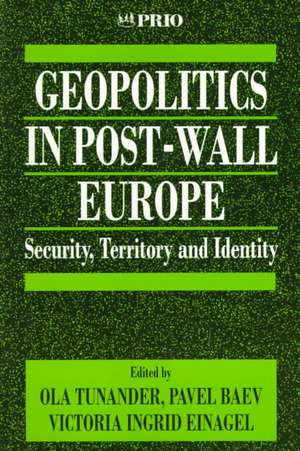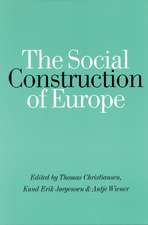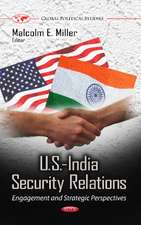Geopolitics in Post-Wall Europe: Security, Territory and Identity: International Peace Research Institute, Oslo (PRIO)
Editat de Ola Tunander, Pavel Baev, Victoria Ingrid Einagelen Limba Engleză Paperback – 17 mar 1997
Preț: 489.37 lei
Nou
Puncte Express: 734
Preț estimativ în valută:
93.64€ • 98.03$ • 77.48£
93.64€ • 98.03$ • 77.48£
Carte tipărită la comandă
Livrare economică 07-21 aprilie
Preluare comenzi: 021 569.72.76
Specificații
ISBN-13: 9780761955504
ISBN-10: 076195550X
Pagini: 272
Dimensiuni: 156 x 234 x 22 mm
Greutate: 0.45 kg
Ediția:1
Editura: SAGE Publications
Colecția Sage Publications Ltd
Seria International Peace Research Institute, Oslo (PRIO)
Locul publicării:London, United Kingdom
ISBN-10: 076195550X
Pagini: 272
Dimensiuni: 156 x 234 x 22 mm
Greutate: 0.45 kg
Ediția:1
Editura: SAGE Publications
Colecția Sage Publications Ltd
Seria International Peace Research Institute, Oslo (PRIO)
Locul publicării:London, United Kingdom
Recenzii
`The analyses are wide-ranging, anti-determinist and sensitive to culture and accident. None crudely computes power. The book is a product of passion and commitment... This makes the essays refreshing, engaging and instructive in a way unattainable by pretended objectivity' - International Affairs
`This volume is an ambitious attempt to rethink the ways in which Europe is portrayed in the discipline of International Relations... The project offers some interesting contemporary material, and some excellent individual chapters.... The contemporary examples and its eschewal of a statist framework of analysis make the book worth our attention' - Millennium - Journal of International Studies
`This volume is an ambitious attempt to rethink the ways in which Europe is portrayed in the discipline of International Relations... The project offers some interesting contemporary material, and some excellent individual chapters.... The contemporary examples and its eschewal of a statist framework of analysis make the book worth our attention' - Millennium - Journal of International Studies
Cuprins
Introduction - Ola Tunander
PART ONE: A NEW EUROPEAN ORDER: GENERAL TENDENCIES
Post-Cold War Europe - Ola Tunander
A Synthesis of a Bipolar Friend-Foe Structure and a Hierarchic Cosmos-Chaos Structure?
Obstinate and Obsolete - Pierre Hassner
Non-Territorial Transnational Forces versus the European Territorial State
Imperial Metaphors - Ole Waever
Emerging European Analogies to Pre-Nation-State Imperial Systems
Nation States and Empires in the Current Process of European Change - Uffe [sl]Ostergaard
Europe's Relations with the Muslim World - Shireen T Hunter
Emerging Patterns of Conflict and Cooperation
PART TWO: RUSSIA AND THE WEST - FROM COLD WAR TO A `COLD PEACE'?
The Geopolitics of Delineating `Russia' and `Europe' - Iver B Neumann
The Creation of the `Other' in European and Russian Tradition
Russia's Departure from Empire - Pavel K Baev
Self-Assertiveness and a New Retreat
Possible Scenarios for Geopolitical Shift in Russian-European Relations - Yuriy Borko
PART THREE: THE BALKANS: BETWEEN EUROPE AND THE `OTHER'
The New Balance of Power in South-Eastern Europe - Christopher Cviic
Notes Towards a Provisional Assessment
Lasting Peace in Bosnia? Politics of Territory and Identity - Victoria Ingrid Einagel
Concluding Remarks - Edward Mortimer
PART ONE: A NEW EUROPEAN ORDER: GENERAL TENDENCIES
Post-Cold War Europe - Ola Tunander
A Synthesis of a Bipolar Friend-Foe Structure and a Hierarchic Cosmos-Chaos Structure?
Obstinate and Obsolete - Pierre Hassner
Non-Territorial Transnational Forces versus the European Territorial State
Imperial Metaphors - Ole Waever
Emerging European Analogies to Pre-Nation-State Imperial Systems
Nation States and Empires in the Current Process of European Change - Uffe [sl]Ostergaard
Europe's Relations with the Muslim World - Shireen T Hunter
Emerging Patterns of Conflict and Cooperation
PART TWO: RUSSIA AND THE WEST - FROM COLD WAR TO A `COLD PEACE'?
The Geopolitics of Delineating `Russia' and `Europe' - Iver B Neumann
The Creation of the `Other' in European and Russian Tradition
Russia's Departure from Empire - Pavel K Baev
Self-Assertiveness and a New Retreat
Possible Scenarios for Geopolitical Shift in Russian-European Relations - Yuriy Borko
PART THREE: THE BALKANS: BETWEEN EUROPE AND THE `OTHER'
The New Balance of Power in South-Eastern Europe - Christopher Cviic
Notes Towards a Provisional Assessment
Lasting Peace in Bosnia? Politics of Territory and Identity - Victoria Ingrid Einagel
Concluding Remarks - Edward Mortimer
Descriere
The fall of the Berlin Wall symbolized a dramatic turning point in the history of European politics and security. Geopolitics in Post-Wall Europe highlights the new relations between politics, culture and territory. It analyzes the major geopolitical shifts in the connection between security and identity.
Part One covers the general geopolitical tendencies in Europe, including conflicts between `culturism' and universalism, between national-romantic primordialism and cosmopolitan post-national identities, and between territory and escape from territory. Part Two deals with potential tensions between Russia and Europe and the possible emergence of a new European `wall' between an extended NATO on the one hand, and Rus


















